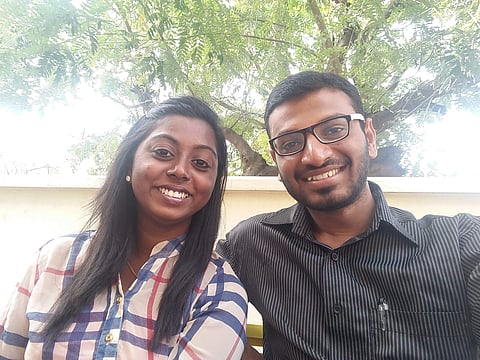

While pursuing his Masters' in Education at Azim Premji University in Bengaluru, Regila Marinus met Coimbatore-based Ram Prakash K. Immensely impacted by the state of education in her home state of Tamil Nadu, Regila and Ram began discussing what they could do to improve education imparted at government schools. "The course at Azim Premji University also taught us how to look at the education system as a whole, understand its problems and find methods to address those," says Regila. During one such lecture during university, Regila and Ram discovered how the leaders and decision-makers are the ones who determine the quality of education being imparted at the schools. "This made us realise that there are very few organisations who work with school leaders and decision-makers in education in Tamil Nadu," adds Regila. It was then that the duo decided to start Vidya Vidhai Foundation in May 2017.
So, how does the organisation work? Regila explains, "We directly partner with the heads of the institute of a private school or the block education officer or head of a government school. First, we try to identify the gaps in the school in every aspect. It could be related to the well-being of students, training the teachers or even improving the infrastructure. Then, we discuss with the school leader and help start a transformation journey." This process takes about three years to complete. The foundation doesn't readily involve in infrastructure, says Regila. "We only look at infrastructure when it is hindering the learning process," she adds.
Explaining more about this transformation journey, Regila states, "We file a detailed report of the drawbacks and then identify various solutions to it. The different solutions lead to different outcomes." She goes on to narrate an incident where a teacher spent 20 minutes of her 40-minute class time to just settle the students down. "In that particular school, we did sessions on classroom management. How the teachers can get the attention of the students in a fun manner in just 20 seconds and not imposing punishment on children to discipline them. The teachers can learn several strategies, which we have identified after multiple research, trials and errors," says Regila. The teachers could then manage his classroom effectively and he didn't have to spend so much time to begin his lessons, adds Regila.
Classroom management is not the only domain that the foundation works on. "We also focus on how the leader can implement their own vision of the school. The transformation process has to be done in a way that it doesn't unravel once we leave. Moreover, it also has to look to like the school's leader has made the changes in the system and not an external organisation," explains Regila, who designs the programme on which the school transformation is based. She and Ram, who looks after operations - which includes identifying a school and its problems, onboarding it and dealing with stakeholders - heads a team of eight. "Three members have been allocated for government schools two for private schools," says Regila.
Regila notes that the main problem for a government school is the effective utilisation of its resources. "In an area with different schools, it is mostly seen that every school won't have all the amenities like a playground, laboratories or library. What we are trying to look at how these school leaders can collaborate and find what they are lacking in their own schools from a school nearby," says Regila. The duo also focuses on how to make the community involved in the school's decision-making process by collaborating with the heads of the institute. "In a government school, transfers are common and we have to ensure that the transformation is sustainable. For that, we need to involve the community, the parents, who will be able to uphold the changes even when the heads or teachers are gone and new ones come in," says Ram.
To make their transformation plan more effective, the duo ensures that they reserve their feedback on teachers till they are comfortable and familiar enough. "We conduct workshops, interact with them to take them into confidence. We even co-plan lessons together with the teachers who are more difficult to enhance the learning outcomes. Some teachers will be resistant to change and won't be willing enough to adapt to the methods suggested. The ultimate aim is to ensure that the child receives a quality education," says Regila. "We can't make the teachers feel like we are there to change their teaching methods or to teach them how to teach. It is just to enhance the already existing system," adds Ram.
Vidya Vidhai Foundation receives most of its funding from CSR activities and through their incubation. The foundation has been incubated at AIC Raise, which is supported by the Atal Innovation Mission, NITI Aayog. "Our focus is mainly on schools in areas where the reach of NGOs have been less. Over our three years of operation, we have worked with 11 schools in Tamil Nadu - six low-income private schools and five state-run government schools. These schools are mostly located in fishermen communities of Pallavaram and also in rural Madurai and Erode," says Regila. With an aim to impact 500 schools, the foundation has also collaborated with Puducherry's School Education Department to improve the schools in the union territory. "This year we have also onboarded 10 more government schools," says Regila.
